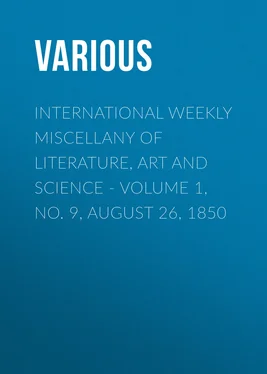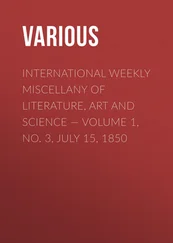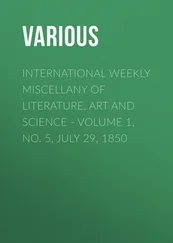Various - International Weekly Miscellany of Literature, Art and Science - Volume 1, No. 9, August 26, 1850
Здесь есть возможность читать онлайн «Various - International Weekly Miscellany of Literature, Art and Science - Volume 1, No. 9, August 26, 1850» — ознакомительный отрывок электронной книги совершенно бесплатно, а после прочтения отрывка купить полную версию. В некоторых случаях можно слушать аудио, скачать через торрент в формате fb2 и присутствует краткое содержание. Жанр: foreign_antique, periodic, foreign_edu, на английском языке. Описание произведения, (предисловие) а так же отзывы посетителей доступны на портале библиотеки ЛибКат.
- Название:International Weekly Miscellany of Literature, Art and Science - Volume 1, No. 9, August 26, 1850
- Автор:
- Жанр:
- Год:неизвестен
- ISBN:нет данных
- Рейтинг книги:4 / 5. Голосов: 1
-
Избранное:Добавить в избранное
- Отзывы:
-
Ваша оценка:
- 80
- 1
- 2
- 3
- 4
- 5
International Weekly Miscellany of Literature, Art and Science - Volume 1, No. 9, August 26, 1850: краткое содержание, описание и аннотация
Предлагаем к чтению аннотацию, описание, краткое содержание или предисловие (зависит от того, что написал сам автор книги «International Weekly Miscellany of Literature, Art and Science - Volume 1, No. 9, August 26, 1850»). Если вы не нашли необходимую информацию о книге — напишите в комментариях, мы постараемся отыскать её.
International Weekly Miscellany of Literature, Art and Science - Volume 1, No. 9, August 26, 1850 — читать онлайн ознакомительный отрывок
Ниже представлен текст книги, разбитый по страницам. Система сохранения места последней прочитанной страницы, позволяет с удобством читать онлайн бесплатно книгу «International Weekly Miscellany of Literature, Art and Science - Volume 1, No. 9, August 26, 1850», без необходимости каждый раз заново искать на чём Вы остановились. Поставьте закладку, и сможете в любой момент перейти на страницу, на которой закончили чтение.
Интервал:
Закладка:
THE "WILD HUSSAR" OF HUNGARY
France, Russia, Prussia, and other countries, have introduced the Hussars into their armies; but these soldiers are merely Russian, French, and Prussian cavalry, dressed in the Hungarian laced jacket: they want the spirit, the horse, and—the 'Magyar Isten.' For this reason, the Hungarian Hussar will not acknowledge them as brethren; and whenever he comes in contact with foreign Hussars, he lets them feel in battle the full force of his contempt. A story is told, that during a campaign against the French in the war with Napoleon, the bivouacs of the Prussian and Hungarian Hussars were near to one another. A Prussian came over to his neighbors in a familiar way with a glass of wine, and drank it to the health of his 'brother hussar.' But the Hungarian gently pushed the glass back, and stroked his beard, saying, 'What brother?—no brother—I hussar—you jack-pudding.'
This expression is not to be mistaken for a brag. The Hungarian hussar is no fanfaron like the French chasseur, but he is conscious of his own powers, like a Grenadier of the Old Imperial Guard. The dolmany, the csako, and the csizma, have grown to his body; they form his holyday dress even when off duty—the national costume transferred into the army; and as he is aware that this is not the case in other countries, the foreign Hussar's dress is in his eyes a mere servant's livery; and logically the man is not altogether wrong.
The Hussar, like the Magyars in general, is naturally good-tempered. The finest man in the service, he is at the same time the most jovial companion in the tavern, and will not sit by and empty his glass by himself when a Bohemian or German comrade at his side has spent all his money. There is only one biped under the sun who is in his eyes more contemptible and hateful than any animal of marsh or forest. This is the Banderial Hussar—that half-breed between Croat and Magyar, that caricature of the true Hussar, who serves in the cavalry, as the Croat in the infantry, of the Military Frontier. Never was an Hungarian Hussar known to drink with a Banderial Hussar; never will he sit at the same table: if he meets a snake he crushes it under foot—a wolf he will hunt in the mountains—with a buffalo he will fight on the open heath—with a miserable horse-stealer he will wrestle for a halter; but as for the Banderial Hussar, he spits in his face wherever he meets him.
It was at Hatvan, or at Tapjo-Bicske, that Hungarian and Banderial Hussars were for the first time in this war—the first time perhaps in the recollection of man—opposed to one another in battle. If looks could slay, there would have been no need of a conflict, for the eyes of the Magyars shot death and contempt at their unworthy adversaries. The signal of attack sounded; and at the same instant, as if seized by one common thought, the Hungarian Hussars clattered their heavy sabres back into the scabbard, and with a fearful imprecation, such as no German tongue could echo, charged weaponless and at full speed their mimic caricatures whom fate had thrown in their way. The shock was so irresistible, that the poor Croats could make no use of their sabers against the furious onset of their unarmed foe: they were beaten down from their saddles with the fist, and dragged off their horses by their dolmanys; those who could save themselves fled. The Hussars disdained to pursue them; but they complained to their Colonel at having been opposed to 'such a rabble.'— Schlesinger .
Original Poetry
A HOROSCOPE
"Quorum pars magna fui."
Oh! loveliest of the stars of Heaven,
Thus did ye walk the crystal dome,
When to the earth a child was given,
Within a love-lit, northern home;
Thus leading up the starry train,
With aspect still benign,
Ye move in your fair orbs again
As on that birth long syne.
Within her curtained room apart,
The pale young mother faintly smiled;
While warmly to a father's heart
With love and prayer was pressed the child;
And, softly to the lattice led,
In whispers grandams show
How those presaging stars have shed
Around the child a glow.
Born in the glowing summer prime,
With planets thus conjoined in space
As if they watched the natal time,
And came to bless the infant face;
Oh! there was gladness in that bower,
And beauty in the sky;
And Hope and Love foretold a dower
Of brightest destiny.
Unconscious child! that smiling lay
Where love's fond eyes, and bright stars gleamed,
How long and toilsome grew the way
O'er which those brilliant orbs had beamed;
How oft the faltering step drew back
In terror of the path,
When giddy steep, and wildering track
Seemed fraught with only wrath!
How oft recoiled the woman foot,
With tears that shamed the path she trod.
To find a canker at the root
Of every hope, save that in God!
And long, oh! long, and weary long,
Ere she had learned to feel
That Love, unselfish, deep, and strong,
Repays its own wild zeal.
Bright Hesperus! who on the eyes
Of Milton poured thy brightest ray!
Effulgent dweller of the skies,
Take not from me thy light away—
I look on thee, and I recall
The dreams of by-gone years—
O'er many a hope I lay the pall
With its becoming tears;
Yet turn to thee with thy full beam,
And bless thee, Oh love-giving star!
For life's sweet, sad, illusive dream
Fruition, though in Heaven afar—
"A silver lining" hath the cloud
Through dark and stormiest night,
And there are eyes to pierce the shroud
And see the hidden light.
Thou movest side by side with Jove,
And, 'tis a quaint conceit, perchance—
Thou seem'st in humid light to move
As tears concealed thy burning glance—
Such Virgil saw thee, when thine eyes,
More lovely through their glow, 2 2 "Lachrymis oculos effusa nitentes."
Won from the Thunderer of the skies
An accent soft and low.
And Mars is there with his red beams,
Tumultuous, earnest, unsubdued—
And silver-footed Dian gleams
Faint as when she, on Latmos stood—
God help the child! such night brought forth
When Love to Power appeals,
And strong-willed Mars at frozen north
Beside Diana steals.
FRIENDSHIP
How oft the burdened heart would sink
In fathomless despair
But for an angel on the brink—
In mercy standing there:
An angel bright with heavenly light—
And born of loftiest skies,
Who shows her face to mortal race,
In Friendship's holy guise.
Upon the brink of dark despair,
With smiling face she stands;
And to the victim shrinking there,
Outspreads her eager hands:
In accents low that sweetly flow
To his awakening ear,
She woos him back—his deathward track.
Toward Hope's effulgent sphere.
Sweet Friendship! let me daily give
Thanks to my God for thee!
Without thy smiles t'were death to live,
And joy to cease to be:
Oh, bitterest drop in woe's full cup—
To have no friend in need!
To struggle on, with grief alone—
Were agony indeed!
THE BALANCE OF LIFE
All daring sympathy—clear-sighted love—
Is, from its source, a ray of endless bliss;
Self has no place in the pure world above,
Its shadows vanish in the strife of this.
Интервал:
Закладка:
Похожие книги на «International Weekly Miscellany of Literature, Art and Science - Volume 1, No. 9, August 26, 1850»
Представляем Вашему вниманию похожие книги на «International Weekly Miscellany of Literature, Art and Science - Volume 1, No. 9, August 26, 1850» списком для выбора. Мы отобрали схожую по названию и смыслу литературу в надежде предоставить читателям больше вариантов отыскать новые, интересные, ещё непрочитанные произведения.
Обсуждение, отзывы о книге «International Weekly Miscellany of Literature, Art and Science - Volume 1, No. 9, August 26, 1850» и просто собственные мнения читателей. Оставьте ваши комментарии, напишите, что Вы думаете о произведении, его смысле или главных героях. Укажите что конкретно понравилось, а что нет, и почему Вы так считаете.












